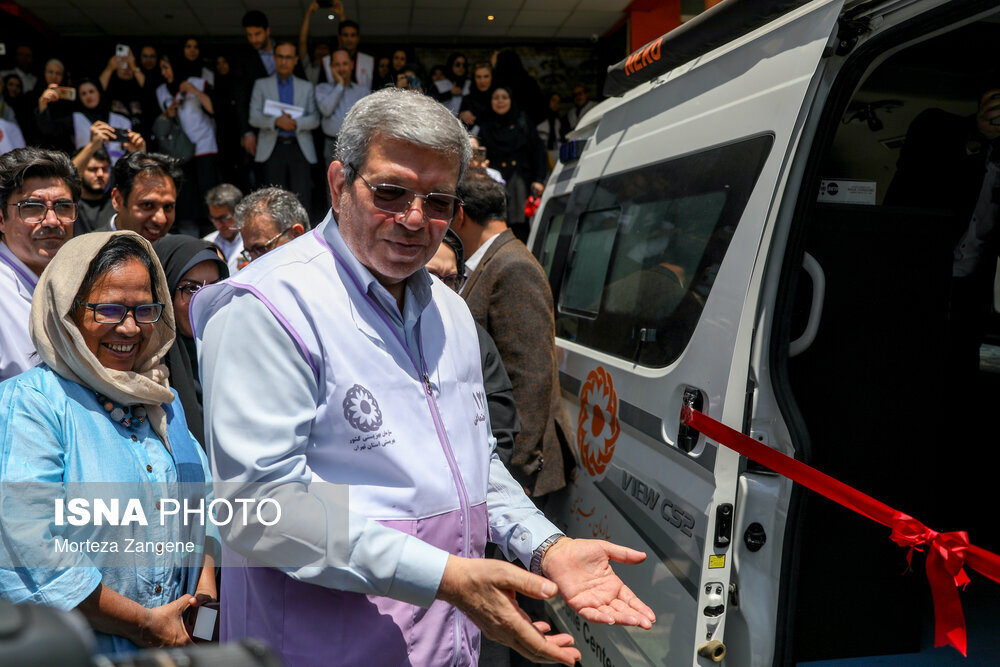Welfare Organization’s services show ‘commitment, inclusiveness, and hope’: UNDP

TEHRAN – The resident representative ad interim for the United Nations Development Program (UNDP) in Iran, Ayshanie Medagangoda-Labé, has commended the Welfare Organization’s services, which have materialized commitment, inclusiveness, and hope over the past 45 years.
Being highly reliable, the Welfare Organization has offered services everywhere from metropolises to the most remote villages, ISNA quoted the official as saying.
She made the remarks while addressing a ceremony for the deployment of harm reduction mobile centers in Tehran on Monday.
The relentless efforts of the organization are based on Article 29 that which guarantees the right to social security for all citizens, she noted. Article 29 specifies that everyone is entitled to social security benefits related to retirement, unemployment, old age, disability, lack of a guardian, accidents, and the need for healthcare and treatment, and that the government is responsible for providing these services and financial support, using national revenues and public contributions, as outlined by law.
The organization has brought dignity and care to those facing deprivation and social exclusion by providing services such as mobile clinics, harm reduction centers, and conducting programs for women, children, and those in need of special services, Medagangoda-Labé added.
The UNDP has had the honor of cooperating with the Welfare Organization through Global Funds to fight against AIDS, Tuberculosis, and Malaria, Medagangoda-Labé stated.
The partnership has led to the development of a resilient and people-centered infrastructure, with over 430 service centers and 58 mobile vans. Over the past year, committed medical staff directly offered services to some 19,000 vulnerable people in remote areas through mobile clinics, the official highlighted.
She went on to say that these efforts and services were not ceased even during the 12-day war imposed by Israel on the country, which indicates not just resilience, but the highest commitment to public health.
The results speak for themselves; over 60 percent of individuals living with HIV know their status, and more than 40 percent of high-risk populations received prevention packages from the organization over the past year.
Welfare Organization provides a large proportion of HIV services in the country, and in more than 90 percent of people being treated, the viral load has been suppressed, the official further noted.
“On our way ahead, the United Nations Development Program and the Welfare Organization will continue their joint efforts. Our goal is to expand mobile services, expand databases to address social harms, and develop evidence-based policies that are inclusive and responsive to future needs, and grounded in human dignity.
The collaboration also has the potential to expand by including mental health services, violence prevention, maintenance treatment, and professional rehabilitation.
“Today, we honor not only the (achievements of) the past, but a promising future wherein any village, area, and home benefit from dignity, hope, and care,” the official stressed.
National Welfare Week
National Welfare Week was held across the country from July 16 to 22. This year, the week was observed with the theme ‘together for well-being; participating today, empowering tomorrow’.
The head of the Welfare Organization, Seyed Javad Hosseini, said that 10,566 housing, employment, social, and rehabilitation projects with a total investment of 520 billion rials (some 580,000 dollars) will be inaugurated on the occasion of the 45th anniversary of National Welfare Week, IRNA reported.
About 77 percent of the projects focus on employment, 21 percent on housing, and the remaining two percent on the social and rehabilitation sector, the official noted.
Moreover, 359 projects will be started, most of which will be implemented in Kerman, Lorestan, and Isfahan provinces.
Over the past year, 14,000 housing units were provided to beneficiaries and people with disabilities. 45,966 houses are under construction. And 1,942 housing units will be handed over to people with disabilities during the week, Hosseini highlighted.
The official went on to announce the launch of a job support fund. “Thanks to welfare services, nearly 200,000 beneficiaries and individuals with disabilities were employed, and the service sector accounts for 62 percent of the employment.
UNDP activities in Iran
Currently, the UNDP activities in Iran are centered around four key areas, including social and economic welfare, health, environment, and disaster risk reduction, Medagangoda-Labé said in April.
The official made the remarks addressing the ceremony held on the occasion of 20 years of UNDP and Welfare Organization partnership, Mehr news agency reported.
“One of the main tasks of the United Nations Development Program is to promote successful models from other countries and introduce them to the Welfare Organization. We always try to secure the necessary financial resources to support activities being carried out in Iran.”
The top priorities of the UNDP in the economic, social welfare area include conducting research, supporting micro and small enterprises, and improving the social and economic well-being of at-risk groups, like female heads of households and vulnerable youth, the official noted.
Health is the second work area, which involves combating communicable and non-communicable diseases. Here, the UNDP works closely with other UN agencies, such as the World Health Organization (WHO) and the United Nations Children’s Fund (UNICEF).
The third area is the environment. The UNDP is trying to protect the country’s natural resources, wetlands, and biodiversity. It also assists in addressing climate change impacts through complying with international standards.
The official went on to say that in the energy sector, the focus is on using renewable resources. Currently, Iran is just using one percent of its potential capacity in renewable energies such as solar, wind, and water.
“We hope to be able to utilize domestic and international capacities to develop solar energy in different centers, such as health,” Medagangoda-Labé said.
The fourth area of the UNDP activities in the country is disaster risk reduction. The successful experience in reducing sand and dust storms is a typical example of cooperation in this sector, the official further noted.
MT/MG
Leave a Comment